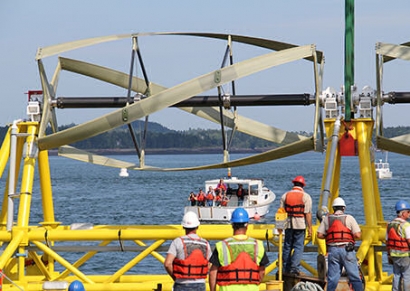
ORPC is a recognized industry leader in the development of underwater power systems for use in free flowing tidal and river sites, and active in North American, South American and European markets. In addition to operating a commercial river power project for the Village of Igiugig, Alaska, ORPC is also working with the communities of False Pass, Alaska, and Eastport Maine, on smart microgrid projects utilizing tidal energy as a baseload resource.
Murkowski asked Davies to comment on federal policy that would help the marine and hydrokinetic (MHK) industry progress. He responded that the industry needs support to build and install multiple devices in the market to reduce costs, and that this in turn will spur domestic manufacturing, and encourage smart microgrid improvements to further the baseload power produced from predictable tidal and river currents.
Murkowski and Davies discussed the potential for reducing the time it takes to obtain a federal license and the opportunity to amend the Department of Energy’s Title XVII loan program rules so that more projects can get financing within the existing loan budget. Davies noted the rapid uptake of wind and solar technologies in the U.S. economy, and how these renewable energy sources benefitted from federal and state incentives that drove costs down, strengthened supply chains, and created approximately 500,000 jobs.
“With the right support over the next five to ten years, MHK technology can rapidly grow to meet our renewable energy objectives providing power to over 100 million people and, in the process, create hundreds of thousands of new manufacturing, engineering, and marine industry jobs,’’ said Davies. “The last ten years were the decade of solar and wind. With the right incentives in place, the next ten years can be the decade of river and tidal energy, bringing with it manufacturing and marine energy jobs to communities across the country and creating a highly-predictable, baseload renewable energy source that will move the U.S. and the world closer to a 100%, renewable energy future.”
Murkowski noted Cook Inlet’s wind and tidal energy potential and the success of ORPC’s RivGen Project with the Village of Igiugig providing half the community’s power needs were ideal proving grounds for MHK technologies. Sen. Angus King, I-Maine, recognized ORPC’s efforts and University of Maine’s offshore wind project in making Maine a leader in ocean energy innovation.
The hearing also included testimony by Dr. Walter Cruickshank, Department of the Interior Bureau of Ocean Energy Management; Daniel Simmons, Assistant Secretary for Energy Efficiency & Renewable Energy, Department of Energy; Siri Kindem, President, Equinor Wind US; and Jonathan Lewis, Senior Counsel, Clean Air Task Force.

